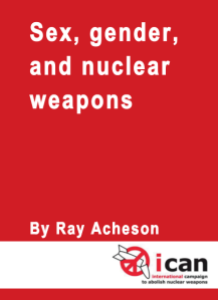The election in Scotland delivered surprises. A first impression that the Tories are back on the rise might dismay nuclear disarmament campaigners, but the reality is that our movement is rising in numbers and commitment.
The Scottish Labour Party is now agreed that scrapping Trident is the way to go, tossing an assurance about the jobs argument as a sop to the GMB Cerebus. Jackie Baillie, the Dumbarton guardian of Trident who managed a hundred vote majority to hang onto her seat, is a notable exception. Party leader Kezia Dugdale now accepts scrapping Trident, and is not the only Labour MSP who has formally signed up to support the 127 countries committed to negotiating a ban treaty.
Let’s not forget though, that it was the UK Labour Party that wrote the white paper for Trident replacement – and acquired nuclear weapons in the first place.
We know that the Scottish independence movement is not the same at the SNP. Greens want independence and have foreign policies that reject the UK’s ideas even more firmly than the SNP, Many Scots view party politics as anathema and seek independence as an internationalist ideal, contributing to world peace.
So the Tory revival? Hanging on to power (Trident) is at the core of the unionist case, and thus unionist voters abandoned the Labour Party at the polls in favour of the Tories. The overall rejection of Trident firmly rooted in support for the internationalist perspective continues to grow.
The turn-out was up a few points on the last Scottish Parliament election, but way below the referendum’s turn-out of the disaffected. Even without them, the pro-indy candidates took 48% with the pro-unionists at 50%, so support for independence is up since the referendum and way up on the last Scottish Parliamentary general election.
Horses for courses and tasks for days.
The SNP at Westminster represents the democratic deficit Scots so keenly feel on nuclear weapons and austerity. At home, the new Scottish Parliament can be more expansive, discussing affairs from different perspectives in the context of a clear and growing anti-Trident majority. In 2011 55% of the elected MSP’s belonged to parties opposing Trident. Now, 72% of MSP’s are in parties that oppose Trident. Lib Dems have more opinions on nuclear weapons than they have MSPs, and are even less consistent on other topics. Proportional Representation, albeit a limited version, delivers 35% gender balance compared to Westminster ‘s 29% and a wider view of the overlap between domestic and structural violence and its ultimate manifestation in nuclear weapons discourse.
What are the next steps political steps for Scotland? Down to us, Trident would be scrapped and Nicola would be at UN. Independence could disarm a UK with nowhere for Trident.
Meanwhile, can our new Parliament ensure our safety with nuclear convoys on our roads? What does Scots Law say abouti nuclear weapons? What part can the Scottish Government take in international negotiations for a nuclear weapons ban treaty? Ask your MSP!

 Setsuko Thurlow
Setsuko Thurlow witness
witness




You must be logged in to post a comment.